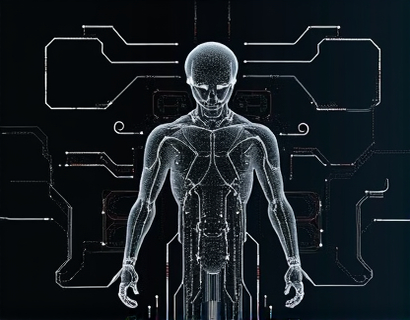AI Certification Innovations: Unlocking Recognition and Career Growth with Specialized Digital Accreditation
The rapid advancement of artificial intelligence (AI) has transformed various industries, creating a high demand for professionals skilled in AI technologies. As AI continues to evolve, the need for robust and recognized certifications has become paramount. These certifications serve as a testament to an individual's expertise and commitment to staying abreast of the latest developments in AI. This article explores the innovations in AI certification, focusing on how specialized digital accreditation is revolutionizing the way professionals validate their skills and enhance their career prospects.
The Importance of AI Certification
In the tech sector, certifications play a crucial role in demonstrating a professional's competence and dedication. For AI, where technologies and methodologies are constantly evolving, obtaining a recognized certification can significantly boost one's credibility and job prospects. Traditional educational paths may not always keep pace with the rapid changes in AI, making continuous learning and certification essential. Specialized digital accreditation addresses this need by offering tailored programs that align with industry requirements and technological advancements.
Specialized Digital Credentials
Specialized digital credentials are at the core of innovation in AI certification. These credentials are designed to validate specific skills and knowledge areas, providing a granular and comprehensive assessment of an individual's capabilities. Unlike general certifications, digital credentials break down the vast field of AI into manageable and focused areas, allowing professionals to demonstrate expertise in particular domains such as machine learning, natural language processing, or computer vision.
These credentials are earned through a combination of completed tasks, educational milestones, and practical assessments. Each credential represents a verified achievement, making it easier for employers to assess a candidate's proficiency. The digital nature of these credentials also ensures they are easily verifiable and portable, enhancing their value in the job market.
How Specialized Certifications Enhance Professional Credibility
Professional credibility is crucial in the competitive tech industry. Specialized AI certifications enhance credibility by providing concrete evidence of an individual's skills and knowledge. Employers and clients are more likely to trust a candidate who has undergone a rigorous certification process, as it demonstrates a commitment to continuous learning and professional development.
Moreover, these certifications often come with a reputation backed by industry leaders or recognized educational institutions. This association adds weight to the credential, further solidifying the professional's standing in the field. The structured and comprehensive nature of these programs ensures that the knowledge and skills gained are relevant and up-to-date, making the certification a reliable indicator of competence.
Job Prospects and Career Advancement
The impact of AI certifications on job prospects and career advancement cannot be overstated. In a market where AI skills are in high demand, holding a recognized certification can set a candidate apart from others. It signals to potential employers that the individual has the necessary expertise to contribute effectively to the team and handle complex AI-related tasks.
Career advancement is another significant benefit. Professionals who obtain specialized AI certifications often find themselves eligible for higher-paying positions and more responsibilities. These certifications can open doors to new opportunities, such as leading AI projects, mentoring junior team members, or transitioning into specialized roles like AI researcher or data scientist.
The Role of Task-Based Assessments
One of the key innovations in AI certification is the use of task-based assessments. Unlike traditional exams that focus solely on theoretical knowledge, task-based assessments require candidates to apply their skills in real-world scenarios. This approach ensures that the certified individual not only understands the concepts but can also implement them effectively.
These tasks can range from coding exercises and data analysis projects to developing AI models and solving complex problems. By completing these tasks, candidates demonstrate their practical abilities, which are often more valuable to employers than theoretical knowledge alone. The hands-on nature of task-based assessments also helps in identifying gaps in knowledge and skills, allowing for targeted improvement.
Educational Milestones and Continuous Learning
Specialized AI certifications are designed to support continuous learning and professional growth. Educational milestones within these programs help break down the learning process into manageable steps, making it easier for individuals to track their progress and stay motivated.
These milestones often include modules on emerging trends, advanced techniques, and best practices in AI. By achieving these milestones, professionals can stay current with the latest developments in the field, ensuring their skills remain relevant. This continuous learning approach is essential in a domain as dynamic as AI, where new breakthroughs and tools are constantly being introduced.
Verification and Portability of Digital Credentials
The digital format of these credentials ensures easy verification and portability. Employers can quickly check the validity of a credential through a secure online platform, reducing the time and effort required for background checks. This efficiency not only benefits employers but also adds convenience for professionals who can easily upload and share their credentials on job applications, LinkedIn, and other professional networks.
Furthermore, the digital nature of these credentials means they are not tied to a specific institution or format. Professionals can carry their certifications with them as they move between jobs or industries, maintaining a consistent record of their skills and achievements.
Industry Recognition and Standardization
For specialized AI certifications to be truly effective, they need to gain recognition across the industry. This involves collaboration between certification bodies, industry leaders, and educational institutions to establish standards and best practices. Standardization ensures that certifications meet certain quality benchmarks, making them more credible and widely accepted.
Industry recognition also helps in creating a level playing field, where professionals from different backgrounds and regions can compete based on their skills rather than their geographical location or educational institution. This global acceptance of AI certifications can drive the adoption of AI technologies across various sectors, fostering innovation and growth.
Challenges and Future Directions
Despite the numerous benefits, the field of AI certification faces several challenges. One major challenge is ensuring the quality and consistency of certification programs. With the rapid pace of AI development, it is crucial to regularly update and refine the content of these programs to remain relevant.
Another challenge is addressing the digital divide, ensuring that professionals from diverse backgrounds have access to these certification opportunities. Efforts to make these programs more accessible, such as offering scholarships or online learning resources, can help bridge this gap.
Looking ahead, the future of AI certification is likely to see even more innovative approaches, such as blockchain-based credentials for enhanced security and transparency, and AI-driven personalized learning paths that adapt to individual learning styles and paces. These advancements will further solidify the role of specialized digital accreditation in shaping the future of professional development in the AI domain.










































